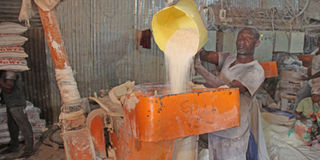Businesses hit hard as govt hikes power tariffs again

Members of Kisenyi Maize Millers Association process flour in Kisenyi, Kampala last week. Millers and other such businesses will be required to pay Shs592.5 per unit of power up from Shs568 previously. PHOTO BY STEPHEN WANDERA OUMA
Kampala- One thing that Mr Moses Tuma, the Kisenyi Millers Association chairman looked forward to this year, was a reduction of power tariffs to at least Shs500.
His optimism was as a result of the frequent promises made by President Museveni that power will be reduced to enable locals add value to agro-products thereby fetching more incomes, create jobs and also support the economy.
For instance, as Ugandans were welcoming 2017, Mr Museveni said government was is in talks with the financiers of Bujagali dam to bring down the cost of electricity to affordable rates for industries.
Electricity from Nalubaale Power Station is now at $1.04cents, he said, since the loan for constructing the facility has been fully paid back. “That of Bujagali is at $11cents,” the President said.
His remarks came just a day after Daily Monitor reported that Museveni’s government, which has been promising Ugandans lower end-user electricity tariffs, had approved the increment of power tariffs by up to 11 per cent with households and kiosk owners paying Shs696.9, up from Shs623.6 for each unit above the sixteenth.
To Mr Tuma’s surprise, this year again two days to 2018, he was told that effective January 1, millers will be required to pay Shs592.5 per unit of power up from Shs568, an increase of about 4.3 per cent.
“The Shs500 that we hoped for, would really be the best ideal for us. It would mean that we would be able to value to process more grain and export [mainly to neighbouring countries] and we create jobs,” Mr Tuma said.
ERA speaks
Electricity Regulatory Authority (ERA) on December 28 announced the increase in what Umeme media manager Stephen Ilungole, told Daily Monitor that “it is not just the retail price of electricity which has increased, the prices of fuel, bread, sugar, among other basic items, have also gone up.”
“Consumers have to appreciate that at some point there will be an increment of the tariffs. The cost of supplying electricity has gone up,” he added.
In the same way, the association whose members at least pay Shs150m in power tariffs per month, too revised their grain milling costs from Shs180 to Shs200 per kilogramme of flour.
“What do you do when you want to stay in business? We have to shift the extra cost to consumers,” Mr Tuma said.
“I personally employ 20 people. If I do not respond to power increase, I will send them home,” he adds.
The power tariff increase is a departure from what President Museveni has been promising industrialists including recently instructing Trade minister Amelia Kyambadde to work out a reduction plan.
Ms Kyambadde was unavailable for comment as she did not answer our repeated calls to her; while the acting permanent secretary Eng Samuel Ssenkungu asked for time to respond to our injuries.
Possible reason
Mr Gideon Badagawa, the Private Sector Foundation Uganda (PSFU) executive director, said the country produces power but fails to attract industries or people to use it and the only way to recoup investors’ money is to charge the few customers highly.
This, he said, has left many small enterprises in a state of near collapse due to high cost of power as they cannot compete with goods produced elsewhere where power is cheap.
“I will not be surprised six months from now; they may announce another increase because we are having a surplus of over 300 megawatts. There are no power consumers yet to pay off the loans, power has to be consumed,” Mr Bagadawa said.
He continued: “Government has to do two things: Generate power but also attract investors and industries to consume the power. Without doing that, you are sinking the economy because you will have to allocate money in the budget to payoff bank loans acquired in putting up dams.”
Effect on local manufacturers
Mr Daniel Birungi, the executive director Uganda Manufacturers Association (UMA), said many local manufacturers that would be using more power are operating below installed capacity due to high cost.
“Every manufacturer would do everything to minimise the cost of power,” Mr Birungi said, continuing that: “But there are issues we have been engaging government on such as local content. Government is the biggest consumer of imported things yet some of these products are manufactured here. We want government to consume what we produce to enable us produce more and consume more power.”
Awaiting formal communication
Mr Birungi specifically declined to comment on the new tariffs but insisted that ERA has not informed UMA members “officially” about the new tariffs and they are engaging government on the matter.
NEW TARIFFS
Costs: The new rates approved and officially released on Thursday last week, will apply to each unit above the 15th. Each of the first fifteen units will cost Shs150.
Restaurateurs, supermarket and clinic operators will pay Shs648.3 up from Shs619.1, an increase of Shs29.2 per unit.
Each unit used to run fuel pumps and for grain milling will cost Shs592.5, up from Shs568, an increase of about 4.3 per cent. Large industries will pay Shs375.5 up from Shs368.1, representing a Shs7.4 increment. The extra-large industrial consumers will part with Shs371.1 up from364.6 for each unit.
For each unit they will use for street lighting, the city authority and municipalities will pay Shs701, which is Shs32.4 more. The 183.2 megawatts Isimba and the 600MV Karuma hydropower plants are set to be commissioned in late 2018 and 2019 respectively.




